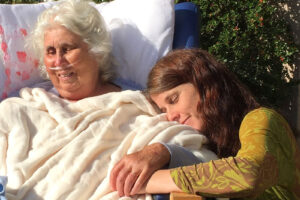As the beauty industry moves away from a one-size-fits-all approach to skin care, there’s one innovative, customizable technology leading the fray: epigenetics. But for those in the cancer research world, this is far more than just a beauty buzzword. Epigenetics has long been at the forefront of studies into how we can regulate our genes and prevent the mutation of cells that lead to disease. Could the meeting of these two applications of epigenetics be the key to treating the unique skin-care issues resulting from cancer and its treatment?
WHAT IS THE EPIGENOME?
Each of us is born with a unique set of genes or DNA, which determines everything from our appearance and height to health issues. Environmental factors like nutrition, pollution, smoking habits, stress, and sun exposure can impact which of these genes activate. The epigenome is considered the control panel of our genes, which determines which genes are active at any
given time.
THE RISE OF EPIGENETICS IN SKIN CARE
Conventional wisdom in the skin-care world says there are five types of skin—oily, dry, combination, sensitive, and acne prone—and these remain immutable throughout our lifetime.
However, studies show that environmental factors can radically impact our gene expression and, according to a 2017 study published in the Journal of the American Academy of Dermatology, this can manifest in our skin.
According to the study, the expression of certain genes has an impact on the ageing of the skin, including DNA repair, mitochondrial structure, and protein metabolism. “If we can selectively turn certain genes off and others on, these new gene patterns could improve the appearance of skin as we age,” explains Dr. Alexa Boer Kimball, a Harvard Medical School researcher and the study’s lead author, in a story for Popular Science.
Much of the effort around epigenetics in skin care has been focused on turning off the genes responsible for ageing, and turning on the genes for rejuvenation. Pioneering the epigenetic movement is biotechnology startup EpigenCare, the first company to create a direct-to-consumer home test that uses a next-generation sequencing technique to analyze epigenetic tags. The noninvasive test measures DNA-methylation levels on genes related to skin factors like ageing, elasticity, moisture, and pigmentation. They are then able to help consumers build a highly targeted skin-care regime by matching them with products that match their epigenetic needs.
DNA skin analysis takes the guesswork and painful mistakes out of finding the perfect skin-care program.
In 2017, Australian skin-care brand Rationale launched DNArray, a genetic test which takes a DNA sample from inside the cheek to determine genetic skin strengths and prescribe a bespoke skin-care plan. “DNA skin analysis takes the guesswork and painful mistakes out of finding the perfect skin-care programme,” says Richard Parker, the founder of Rationale. “It’s specific to each individual, and it is completely accurate.”
THE IMPLICATIONS OF EPIGENETIC SKIN CARE FOR PEOPLE WITH CANCER
Nothing can take a toll on the skin quite like cancer. Those with previously obedient complexions may suddenly find themselves battling a range of skin issues. “Breast cancer can manifest as nodules in the skin, especially the scalp,” says Dr. Maral K. Skelsey, director of Dermatologic
Surgery Center of Washington and a clinical associate professor at Georgetown University School of Medicine. “Some patients with new cancer treatments also develop itchy rashes all over their body along with severe acne.”
Other potential side effects from cancer treatment include red patches, dry and itchy skin, discoloration, and sores. While these issues may seem insignificant in the face of a diagnosis, they can seriously impact a person’s confidence and sense of normalcy.
A study from Washington University published in the journal Neoplasia shows cancer cells can disguise themselves by turning on and off other genes to fit more easily into the soft tissues of the body. It follows that cancer may also alter the genetic code impacting the skin. The personalized skin-care tests created by compa- nies like EpigenCare and Rationale could potentially assist in analyzing these new conditions impacting the skin. This could help people with cancer create a plan of attack that allows them to have more agency over their complexion.
“We do know that genetic differences along with the patient’s microbiome can account for some of the variability in response to diff erent treatment,” says Skelsey. For example, “Epigenetic analysis may allow us to determine which patient is likely to develop severe acne with medication, and we might be able to prescribe an anti-acne regimen before the skin changes
begin.”
Personalized skin care is a small fraction of what scientists may one day achieve with epigenetics—some consider it the next breakthrough in cancer treatment, with growing evidence to suggest it has the potential to overcome chemotherapy resistance. But in the meantime, it may be just the thing people with cancer need to take control over their skin in a time otherwise marked with uncertainty.







